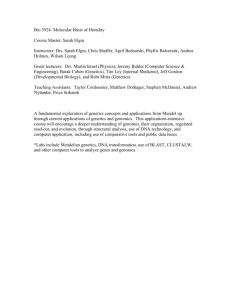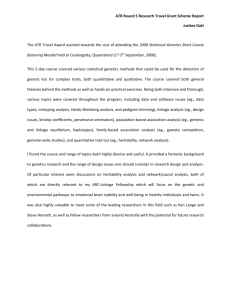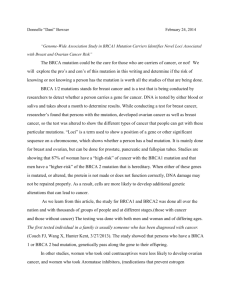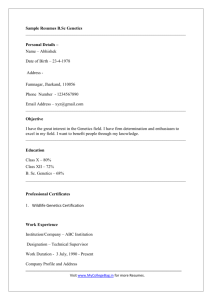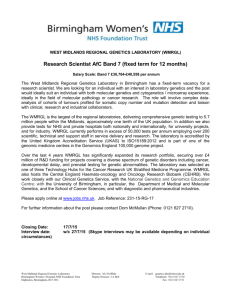MCG FAQ1 - Nottingham University Hospitals NHS Trust
advertisement
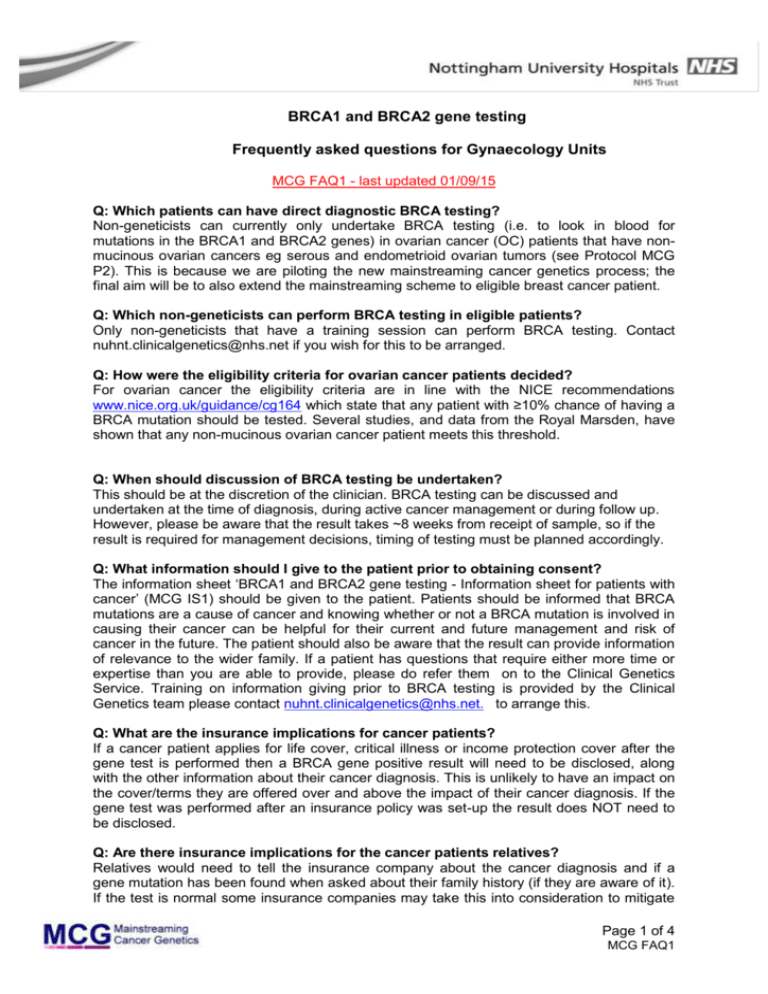
BRCA1 and BRCA2 gene testing Frequently asked questions for Gynaecology Units MCG FAQ1 - last updated 01/09/15 Q: Which patients can have direct diagnostic BRCA testing? Non-geneticists can currently only undertake BRCA testing (i.e. to look in blood for mutations in the BRCA1 and BRCA2 genes) in ovarian cancer (OC) patients that have nonmucinous ovarian cancers eg serous and endometrioid ovarian tumors (see Protocol MCG P2). This is because we are piloting the new mainstreaming cancer genetics process; the final aim will be to also extend the mainstreaming scheme to eligible breast cancer patient. Q: Which non-geneticists can perform BRCA testing in eligible patients? Only non-geneticists that have a training session can perform BRCA testing. Contact nuhnt.clinicalgenetics@nhs.net if you wish for this to be arranged. Q: How were the eligibility criteria for ovarian cancer patients decided? For ovarian cancer the eligibility criteria are in line with the NICE recommendations www.nice.org.uk/guidance/cg164 which state that any patient with ≥10% chance of having a BRCA mutation should be tested. Several studies, and data from the Royal Marsden, have shown that any non-mucinous ovarian cancer patient meets this threshold. Q: When should discussion of BRCA testing be undertaken? This should be at the discretion of the clinician. BRCA testing can be discussed and undertaken at the time of diagnosis, during active cancer management or during follow up. However, please be aware that the result takes ~8 weeks from receipt of sample, so if the result is required for management decisions, timing of testing must be planned accordingly. Q: What information should I give to the patient prior to obtaining consent? The information sheet ‘BRCA1 and BRCA2 gene testing - Information sheet for patients with cancer’ (MCG IS1) should be given to the patient. Patients should be informed that BRCA mutations are a cause of cancer and knowing whether or not a BRCA mutation is involved in causing their cancer can be helpful for their current and future management and risk of cancer in the future. The patient should also be aware that the result can provide information of relevance to the wider family. If a patient has questions that require either more time or expertise than you are able to provide, please do refer them on to the Clinical Genetics Service. Training on information giving prior to BRCA testing is provided by the Clinical Genetics team please contact nuhnt.clinicalgenetics@nhs.net. to arrange this. Q: What are the insurance implications for cancer patients? If a cancer patient applies for life cover, critical illness or income protection cover after the gene test is performed then a BRCA gene positive result will need to be disclosed, along with the other information about their cancer diagnosis. This is unlikely to have an impact on the cover/terms they are offered over and above the impact of their cancer diagnosis. If the gene test was performed after an insurance policy was set-up the result does NOT need to be disclosed. Q: Are there insurance implications for the cancer patients relatives? Relatives would need to tell the insurance company about the cancer diagnosis and if a gene mutation has been found when asked about their family history (if they are aware of it). If the test is normal some insurance companies may take this into consideration to mitigate Page 1 of 4 MCG FAQ1 the unfavourable impact of the family history on the policy. Unaffected individuals do not have to disclose the results of predictive gene testing to insurance companies but may choose to do so, particularly if the test is negative. Q: Which consent form should I use? You should use the ‘Consent for Genetic Testing’ form (MCG F1). The form is available online at http://www.nuh.nhs.uk/our-services/services/genetics/clinical-genetics/informationfor-healthcare-professionals/mainstreaming-cancer-genetics. Once completed, the form should filed in the patient notes and a copy given to the patient. It should NOT be sent to the lab. Q: Which lab form should I use? A standard genetics blood taking form should be used. Please send the form to the Nottingham molecular genetics lab based in the Gables Building at Nottingham City Hospital, together with the 1 EDTA sample. Complete all the relevant boxes on the form as usual. Q: How long does it take to get a BRCA result? The results of full analysis of the BRCA1 and BRCA2 genes typically take about 8 weeks. If there is a known mutation in the family the result takes 4 weeks, any such presymptomatic testing is carried out by the Clinical Genetics Service. In very exceptional circumstances the test can be requested as urgent, in which case the result would be available in 5 weeks. Any urgently requested test must be discussed with the laboratory on telephone number 0115 969 1169 ext 55207. Q: Will we receive results of only the BRCA genes? Yes. At the current time we are reporting just the results of the BRCA1 and BRCA2 genes. Q: What if a patient meets the criteria but chooses not to have a test? The test is optional. A patient may decline to be tested, ask to have longer to think about testing or be referred to Clinical Genetics if they wish for more detailed discussions, now or in the future. Page 2 of 4 MCG FAQ1 Q: What if a patient does not meet the testing criteria but wants a test? Patients who do not meet the mainstreaming testing criteria may be eligible for a test on account of their family history. Please see the criteria for referral on to Clinical Genetics which can be found at: http://www.nuh.nhs.uk/our-services/services/genetics/clinicalgenetics/information-for-healthcare-professionals/cancer-referral-management-guide/ If the patient appears to meet these criteria then please do refer them onto Clinical Genetics. Please note, acceptance of the referral by Genetics does not indicate that testing will definitely be performed. Queries about whether or not patients are eligible should be directed to nuhnt.clinicalgenetics@nhs.net or by telephone to the genetic counsellor on-call on telephone number 0115 962 7728. Alternatively they could choose to have the test privately. Q: What if a family member has already had BRCA testing and a mutation has been found? If a member of the family has already had a BRCA test and a mutation has been found then please refer your patient urgently to the Clinical Genetics Service. In this referral as well as putting your patient’s details put details of the family member reported to have a BRCA mutation. If you have any queries regarding this please contact us on nuhnt.clinicalgenetics@nhs.net or by telephone on 0115 962 7728, ask to speak to the genetic counsellor on-call. Q: Who will give the patient the result of the BRCA test? The result will be sent to the requesting clinician. It is the responsibility of the person that consented the patient to the test to inform the patient of the result. Template result letters and additional information leaflet are provided by clinical genetics to facilitate this (MCG IS 2/3/4 and GRL1/2/3). The GP should also be notified of the result. Please send an urgent referral to the Clinical Genetics Service if a patient receives a BRCA1/2 positive result. Thiscan be sent by fax to 0115 962 8042 or by emailing to nuhnt.clinicalgenetics@nhs.net . We will aim to offer the patient an appointment within 4 weeks. Q: What happens if no mutation is identified? The requesting clinician will need to inform the patient of the result in writing (MCG GRL1) and to send the patient an information sheet ‘Receiving a normal BRCA1 and BRCA2 test result’ (MCG IS2). You should use the result as appropriate for their cancer management, but usually no input is required from the Clinical Genetics Service unless you have concerns due to the family history of cancer and possible other cancer syndromes. If the patient has additional questions about the result please refer to the Clinical Genetics team. Please note, patients and their relatives may still be eligible for enhanced mammographic surveillance on account of their family history. Relatives can seek advice about enhanced screening by asking their GP for a referral to their local breast cancer family history clinic. Q: What happens if a mutation is identified? The requesting clinician will need to inform the patient of the result, we would highly recommend that this was done in person rather than in writing. Template letters are provided to give the patient written documentation of the discussion (MCG GRL2) and it is recommended that the patient receives the information sheet ‘Receiving a BRCA1 and BRCA2 test result that identifies a mutation’ (MCG IS3). You should use the result as appropriate for their cancer management. A referral to clinical genetics for the patient should be faxed to 0115 962 8042 or emailed to nuhnt.clinicalgenetics@nhs.net. The Clinical Genetics team will have further discussions with the patient about a wide variety of issues including; future cancer risk management, cascading information to other family members, support issues etc. Page 3 of 4 MCG FAQ1 Q: What if there is an unclassified variant? Very occasionally (<1%), we identify a variant that does not fulfill the criteria for pathogenic mutations, but may requires further evaluation. In such cases, an information sheet (MCG IS4) should be provided and an appointment with Clinical Genetics should be requested by fax 0115 962 8042 or email nuhnt.clinicalgenetics@nhs.net. The result and further analyses required will be discussed with the patient. Q: If a mutation is identified who will follow-up the patient’s relatives? The Clinical Genetics team will support the patient cascading information about the BRCA gene to other family members. Usually this will include giving the patient a “To whom it may concern letter” to give to relatives. This letter will explain that a cancer predisposition gene mutation has been identified in the family and that relatives can ask their GP to refer them to their local genetics service to discuss the implications. This is standard practice in Genetics. Q: If the patient does not have a BRCA mutation, are there additional genetic tests that should be performed? Some patients may be eligible for further tests, particularly if they were diagnosed at a particularly young age (ie Li–Fraumeni syndrome genetics testing is offered to all patients diagnosed with breast cancer <30yrs), if they have multiple primary cancers or if there is an extensive or unusual family history of cancer. We recommend that such patients are referred to Clinical Genetics. Q: Who should I contact if I have any questions? Questions should be addressed to the on-call genetic counsellor on telephone number 0115 962 7728. They can also be emailed to us at nuhnt.clinicalgenetics@nhs.net. Please contact nuhnt.clinicalgenetics@nhs.net if you have suggestions for additional questions. Page 4 of 4 MCG FAQ1

